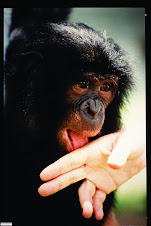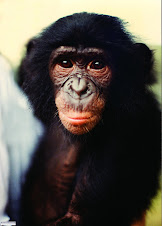 In 1986, as a Peace Corps volunteer, I was placed on "loan" to the World Health Organization (WHO) to work on a specific question: what was the wild animal reservoir of monkeypox disease? The WHO logo on the driver and passenger doors of the project's short-bed Toyota lent authority in the interior, where one survived by wits, bluff, and knowing what motivated action in a nation known for its paralysing inertia. We were three -- me, a Zairian driver, and a nurse. On the road for six months, we sampled small mammals in four widely varying sites in the country.
In 1986, as a Peace Corps volunteer, I was placed on "loan" to the World Health Organization (WHO) to work on a specific question: what was the wild animal reservoir of monkeypox disease? The WHO logo on the driver and passenger doors of the project's short-bed Toyota lent authority in the interior, where one survived by wits, bluff, and knowing what motivated action in a nation known for its paralysing inertia. We were three -- me, a Zairian driver, and a nurse. On the road for six months, we sampled small mammals in four widely varying sites in the country.One time, in an extremely remote area of Bandundu, far from civilization, we came upon a river that we could not cross, because the ferry had shut down for the day. We were about half-way through our voyage from Lisala to Lodja to Kikwit to Kinshasa and then to Tshela, Bas-Zaire and back again to Kinshasa. (People who know the country will tell you that this route cannot be traveled by road, but we managed to do it.) Our cargo included hundreds of precious tissue samples from rodents that were ultrafrozen in liquid nitrogen.
It was only about 4:00 pm, but we could see both banks dotted with travelers, all seemingly resigned to spending the night on the wrong side of the water. A vehicle or two were also stranded, but in the usual Zairian way, no one was bucking the system -- there was a group of loiterers drinking at a dive with distorted music blaring from a battery powered boom box sitting on an overturned yellow plastic beer crate.
But for me, there was no way was I going to lose hours of driving. Cueing my driver to honk, I thumped loudly on the passenger side of the door as we rounded the bend and came to a dramatic stop in front of the white-washed official hut of the ferry-minders.
A crowd quickly assembled. I hollered, still beating on the WHO sign, "Hurry, hurry, get the ferry boatmen here quickly! We have to get to the other side tonight! Our vaccines will melt!"
The crowd was energized into shouting and the ferry workers soon trotted up. I showed them the liquid nitrogen tank in the back, and opened the lid to let them feel the instantly freezing vapor. "We must hurry and get across, this freezer will run out tonight and our precious medical supplies will be ruined!"
My driver and nurse played along, using the medical card that had always worked in the past. The people had never seen a liquid nitrogen tank, nor even a real freezer in this region. But the thought that lifesaving medicine would be lost convinced them to fire up the ferry and take us, and a load of lucky travelers on foot, to the other side.
As a thank-you, we passed out four WHO approved medicines that we were allowed to freely hand out to the population, as their usage was commonly understood: aspirin, multivitamins, a wormer, and an anti-malarial treatment. The crowd was delighted and roared their approval as we gunned off in the truck.
An hour and a half later, satisfied at our small feat of conquering the government officials, and still laughing at the expression of astonishment on everyone's faces at the ferry crossing, we stopped at a village for the night, and went to find the chief to ask for a place to stay. We knew that our passage would be the topic of wonder and many questions for months to come, as word would travel up and down the area about the crazy woman who carried a freezer in a tank, and how their quick action had saved the vaccines.













No comments:
Post a Comment